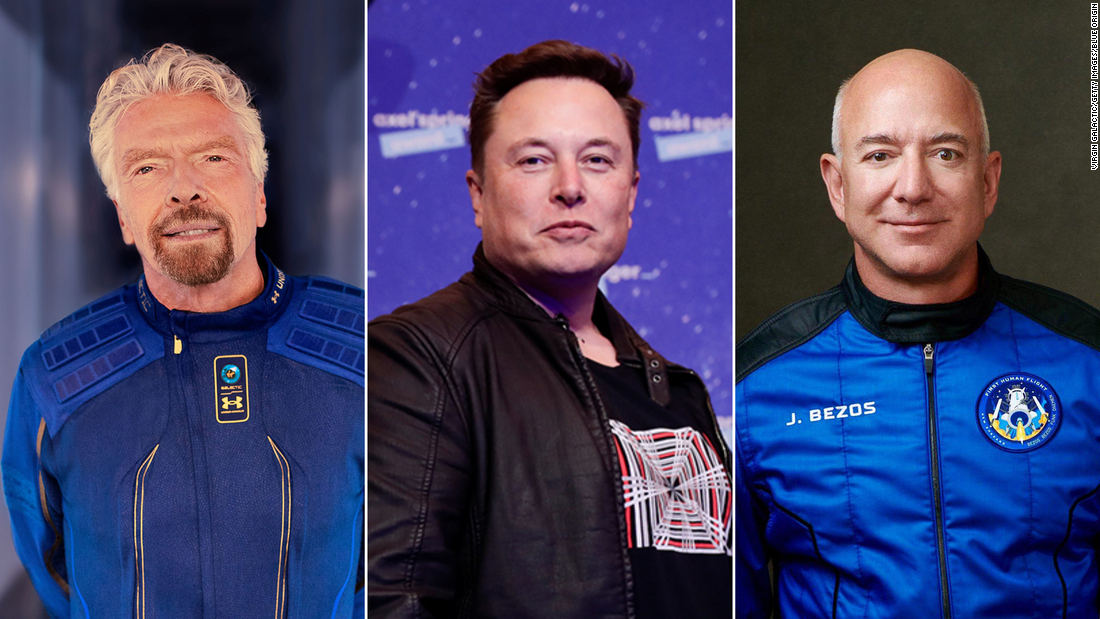2021: The year of space tourism - 4 minutes read

New York (CNN Business) When future generations write about the history of space travel, 2021 may well get its own chapter. "The year of the billionaires," it might be called.
Jeff Bezos and Richard Branson each took supersonic joy rides to the edge of space, finally bringing their competing private-sector spacecraft into operation after around two decades of promises. Celebrities such as 90-year-old "Star Trek" actor William Shatner and "Good Morning America" co-host Michael Strahan followed soon after. Another billionaire self-funded a historic, three-day mission aboard a SpaceX orbital capsule that flew higher than any human has traveled in decades.
And all that promises to just be the beginning.
The trio of space billionaires — Branson, Bezos and Elon Musk — have their eyes set squarely on the future. Over the past year, their visions continued to bump up against one another, stirring up plenty of controversy and one-upmanship.
Here's a look back at some of the most memorable moments the commercial space industry had to offer in the last year.
Branson's and Bezos' space companies have for years been working to develop spacecraft capable of taking paying customers on brief, supersonic trips to the edge of space, promising to usher in an age in which booking a flight to view the Earth from space is as easy as jetting across the Atlantic. (Musk's SpaceX, it should be noted, is not in the suborbital tourism game. Its rockets and spacecraft take much longer and more dangerous treks into Earth's orbit.)
We're not quite there yet. But both billionaires pledged to kick off their respective suborbital space tourism businesses by taking the rides themselves, both as a show of their confidence in their vehicles' safety and some strategic PR.
Both billionaires' flights ended without apparent issue, with the men emerging from their respective spacecraft outfitted in custom flight suits and beaming for the cameras.
Adding to the spectacle, both flights also carried some notable crewmates for the billionaires.
Bezos' successful July launch catapulted the company into a busy rest of the year spent flying some high-profile figures as "honorary guests" — meaning they didn't have to pay for tickets. Shatner took his suborbital excursion in October , a feat widely celebrated by "Star Trek" fans that was followed by an Amazon video special on the flight. Michael Strahan and Laura Shepard Churchley, the daughter of famed astronaut Alan Shepard, flew in December
While Blue Origin was sending celebrities to space, Virgin Galactic faced significant delays . A report from the New Yorker revealed that warning lights had gone off in the cockpit during Branson's flight and the space plane had traveled outside its designated airspace for 41 seconds. The Federal Aviation Administration grounded all flights pending a review, which concluded in September and gave Virgin Galactic the all-clear. Still, the company is delaying the start of commercial services, citing unrelated technology upgrades
Blue Origin, meanwhile, has faced its own controversies, though none that have indicated specific safety issues with its rocket or spacecraft.
Though Musk does not have any apparent plans to join one of SpaceX's missions, his company continued to prove its technology chops. It drastically expanded its space-based internet service, Starlink, growing the constellation to include roughly 2,000 satellites. Its Dragon spacecraft also launched and returned astronauts to and from the International Space Station this year, and it topped the billionaire space tourism competition with a historic space tourism mission of its own.
The passengers floated around the capsule, played songs, created works of art and kept in touch with ground control as their 13-foot-wide capsule whisked around the planet once about every 90 minutes, traveling at more than 17,500 miles per hour.
Bezos and Musk each want their own companies to be at the center of NASA's plans to return astronauts to the moon this decade. But after initially planning to bring on more than one contractor to build the lunar lander for the job, NASA later said it only had enough money for one — and it went with Musk's SpaceX. It awarded $2.9 billion to the company
But a federal judge delivered a major blow to Blue Origin in November by ruling in favor of NASA and SpaceX. That put the future of the Bezos-owned company's plans to build a lunar lander into question.
The ordeal highlighted how important government contracts are to the viability of the commercial space industry. Though these companies are private, their revenue streams still rely heavily on taxpayer money.
And the battle over NASA's moon lander contract queued up what are sure to be more high-profile battles and an interesting few years ahead, as NASA and its contractors map out a path back to the lunar surface for the first time in half a century.
Source: CNN
Powered by NewsAPI.org